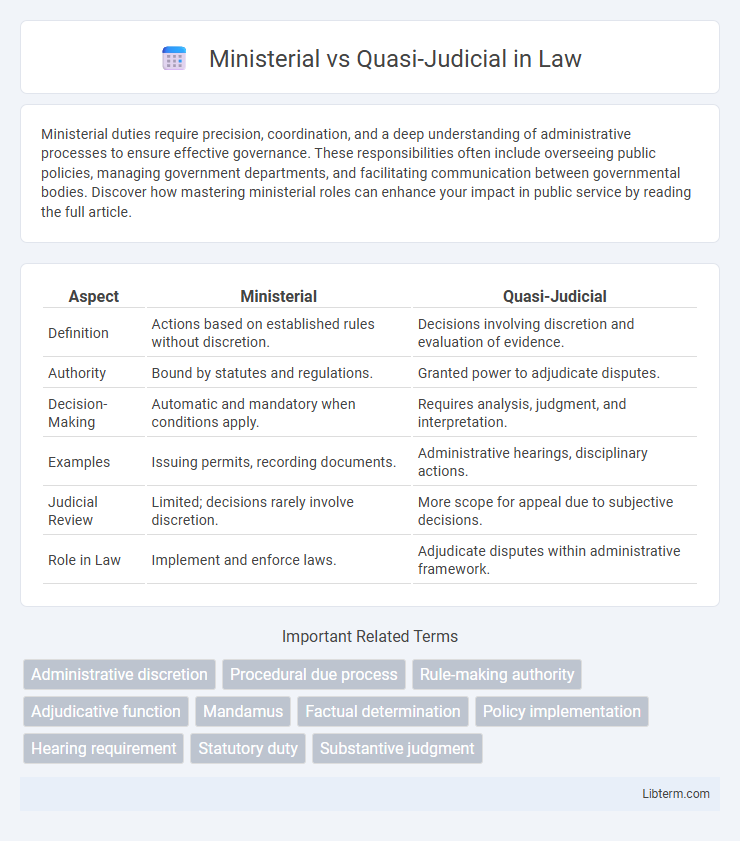Ministerial duties require precision, coordination, and a deep understanding of administrative processes to ensure effective governance. These responsibilities often include overseeing public policies, managing government departments, and facilitating communication between governmental bodies. Discover how mastering ministerial roles can enhance your impact in public service by reading the full article.
Table of Comparison
| Aspect | Ministerial | Quasi-Judicial |
|---|---|---|
| Definition | Actions based on established rules without discretion. | Decisions involving discretion and evaluation of evidence. |
| Authority | Bound by statutes and regulations. | Granted power to adjudicate disputes. |
| Decision-Making | Automatic and mandatory when conditions apply. | Requires analysis, judgment, and interpretation. |
| Examples | Issuing permits, recording documents. | Administrative hearings, disciplinary actions. |
| Judicial Review | Limited; decisions rarely involve discretion. | More scope for appeal due to subjective decisions. |
| Role in Law | Implement and enforce laws. | Adjudicate disputes within administrative framework. |
Introduction to Ministerial and Quasi-Judicial Functions
Ministerial functions involve tasks performed according to established laws or rules without personal judgment, such as issuing permits or certifying documents. Quasi-judicial functions require decision-makers to evaluate facts, interpret laws, and apply discretion in resolving disputes, similar to judicial proceedings. Understanding the distinction ensures clarity in administrative authority and procedural requirements within government agencies.
Defining Ministerial Roles in Governance
Ministerial roles in governance involve tasks that require adherence to established laws and procedures without personal judgment or discretion, ensuring consistent and objective execution of duties. These roles contrast with quasi-judicial functions, where officials exercise discretionary powers to interpret laws and make decisions affecting rights or obligations. Defining ministerial responsibilities emphasizes clear, rule-based actions that maintain administrative order and legal compliance in government operations.
Understanding Quasi-Judicial Powers
Quasi-judicial powers allow administrative agencies to interpret laws, conduct hearings, and make decisions impacting individual rights, closely resembling judicial functions without forming part of the judiciary. Unlike ministerial acts, which involve routine, predetermined duties without discretion, quasi-judicial actions require evaluation of evidence, application of legal standards, and issuance of rulings that can be subject to judicial review. Understanding quasi-judicial authority is essential for recognizing the balance between administrative regulation and legal safeguards ensuring fair process.
Key Differences: Ministerial vs Quasi-Judicial Duties
Ministerial duties involve performing tasks strictly according to established laws or regulations without personal judgment, such as issuing permits or recording documents. Quasi-judicial duties require decision-makers to evaluate evidence, interpret laws, and exercise discretion to resolve disputes, similar to judicial proceedings. The key difference lies in discretion: ministerial actions are mandatory and procedural, while quasi-judicial actions involve judgment and legal reasoning.
Legal Framework Governing Ministerial Actions
The legal framework governing ministerial actions is strictly defined by statutes and regulations that require officials to perform duties without discretion, focusing on the application of established law to clear facts. Ministerial acts demand compliance with prescribed standards, leaving no room for judgment or interpretation, ensuring predictability and consistency in administrative processes. This contrasts with quasi-judicial actions, which involve discretion, hearings, and determinations akin to judicial proceedings.
Principles Guiding Quasi-Judicial Decision-Making
Quasi-judicial decision-making follows principles such as impartiality, fairness, and due process to ensure just outcomes in administrative hearings. Decisions must be based on evidence presented, maintaining neutrality and avoiding bias or conflicts of interest. These principles distinguish quasi-judicial functions from ministerial acts, which involve routine tasks without discretionary judgment.
Examples of Ministerial Acts
Ministerial acts involve duties performed according to fixed rules or instructions without personal judgment, such as issuing building permits, recording deeds, or certifying documents. These acts contrast with quasi-judicial functions where officials exercise discretion or make decisions based on evidence, like zoning board hearings or administrative law judge rulings. Examples of ministerial acts include notarizing signatures, verifying tax payments, and processing license applications strictly by compliance criteria.
Case Studies: Quasi-Judicial Functions in Practice
Quasi-judicial functions involve public authorities making decisions that affect individual rights through hearings and evidence evaluation, as seen in landmark case studies like Gold Coast City Council v. Smith, where administrative bodies adjudicated zoning disputes with judicial procedures. Unlike ministerial acts which are purely administrative and focus on adhering to predetermined rules, quasi-judicial actions require discretion, judgment, and interpretation of law, exemplified by the Supreme Court ruling in Marbury v. Madison affirming the importance of such functions in administrative law. These case studies highlight the critical balance between administrative efficiency and protecting legal rights through procedural fairness in quasi-judicial decisions.
Impact of Ministerial and Quasi-Judicial Functions on Administrative Law
Ministerial functions involve routine, nondiscretionary duties performed by government officials following established rules or statutes, ensuring consistent application of administrative law without room for personal judgment. Quasi-judicial functions require decision-makers to exercise discretion and evaluate evidence, resembling judicial proceedings and significantly shaping administrative law by setting precedents and ensuring due process. The distinction affects administrative law by balancing efficiency and fairness, with ministerial acts promoting uniformity and quasi-judicial acts providing opportunities for contestation and protection of individual rights.
Conclusion: Choosing the Right Approach for Effective Governance
Ministerial actions involve straightforward application of established laws or regulations without discretion, ensuring consistency and efficiency in governance. Quasi-judicial processes require discretion and judgment to resolve disputes or make decisions, offering fairness and individualized assessments. Selecting the appropriate approach balances administrative efficiency with fairness, crucial for effective governance and public trust.
Ministerial Infographic

 libterm.com
libterm.com